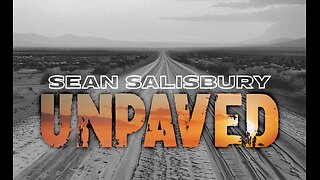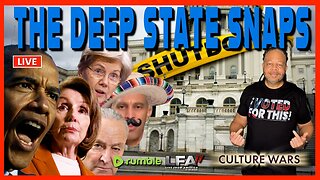Premium Only Content

The introduction to Norman Spinrads:Other Americas, Published in 1988.
The introduction to Norman Spinrads:Other Americas,
Published in 1988.
OTHER AMERICAS.
An Introduction to the Volume.
I HAVE ALWAYS BEEN fascinated—some might say obsessed—as a writer with the possible future destinies of America, and not just because I'm an American. Indeed much of the rest of the world shares this obsession, for America is not quite like other nations. Nor has it ever been regarded as such by the other peoples of the world. Military might and economic dominance are obviously part of this worldwide fascination with America. The United States is still the most militarily powerful nation on Earth, with a network of fleets and bases that encompasses much of the globe. The American economy is so dominant even in its current travails that Arabs are constrained to price the oil they sell to the Europeans and Japanese in dollars and the world catches a financial cold when America sneezes.
But there's much more to it than that. The rest of the world has a complex and ambivalent emotional relationship with America that no other nation evokes, including its close military rival, the Soviet Union, and its close economic rival, Japan. The United States is hated by the peoples of Latin America whom it thoroughly dominates, economically, politically, and militarily, and yet these same peoples gobble up its popular culture like cotton candy and dream of some other America of the heart's desire that will rescue them from poverty and domestic tyranny.
The French are forever complaining about "Anglophone cultural imperialism" and periodically attempt to purge their language of "Franglais," even as their best filmmakers seek to make Hollywood movies in English, their young people dance to American rock and roll, and their trendsetters emulate their own concept of American chic. Our number-one economic competitor, Japan, plays baseball, is developing a weird fascination for American football, has its own Disneyland, and is becoming addicted to American-style junk food. At the height of the Vietnam War, when America was the international villain throughout the Third World, a cargo-cult tribe in New Guinea still attempted to purchase Lyndon Johnson to come and be their president.
Even our archenemies, the Russians, crave nothing so much as to be accepted as fraternal equals by the people of the United States. Why should this be so? The Soviet Union is almost our military equal. Japan is in some ways already our economic superior. Sweden, Switzerland, and Germany now have higher standards of living. From whence the magic of America? In part, no doubt, the answer is the English language. As the dollar is the closest thing this planet has to a world currency, so is English the closest thing there is to a world language. It is the first language of perhaps four hundred million people, and while more people may have grown up speaking the various dialects of Chinese, English is the second language of untold hundreds of millions more throughout the world. English is the language that binds together multilingual societies in India, in much of Africa, in the Philippines. It is spoken by more people than not in Scandinavia and the Netherlands. It is studied by every schoolchild in Japan and the Soviet Union. English is the international language of aviation.
A French pilot landing on a German airfield communicates with the tower in English. Indeed an Arab pilot landing on an Arab airfield will also communicate with the controllers in English. English is the language of international commerce. English has long since supplanted French or German as the language of international science. But English can't be the whole answer, for Britain also speaks English, and it was the British, not the Americans, who spread English far and wide in Africa, who made it the, ah, lingua franca of India, and yet the peoples of the world do not really see English as the language of Great Britain. They relate to it emotionally as the language of America.
Show business probably has a lot to do with that. English is also, of course, the international language of show business, the American market is by far the dominant English language market, and so American film, television, radio, and music have long since come to quite dominate international media. And not only economically but in terms of iconography and imagery. There is no jungle so remote that American rock and roll cannot be picked up on a transistor radio. American film and TV stars are instantly recognizable almost anywhere on earth as are such purely American archetypes as the cowboy, the hardboiled private eye, the vigilante avenger and Superman. Dallas, Miami Vice, and even old I Love Lucy reruns inundate the airwaves in scores of countries, and, I kid you not, a famous book-length Marxist treatise in Spanish explores the imperialistic political significance of the mythic substructure of the adventures of Donald Duck. But even the universality of American show business is not the whole answer.
There is still something more. A something, that, in the end, is what I believe brought me to write the short novels in this book, as well as such novels as Bug Jack Barron, The Mind Came, The Men in the Jungle, Songs from the Stan, and Link Heroes, all of which are, in their diverse ways, American science fiction and America as science fiction. For America—not as a geographic entity or conventional nation state but as a concept-has from its birth been a dream of the future, a kind of real world science fictional speculation, for the peoples of the Earth. America was, after all, "discovered" in 1492 as if it were a virgin alien planet. And colonized by people from all over the world, much as people all over the world now dream of colonizing the Moon or Mars.
And became an independent nation as the embodiment of a radical utopian concept—namely that the populace could and should choose its own rulers as public servants rather than accept the divine right of kings. Two hundred years later, it is difficult to realize just how radical, how speculative, how science-fictional a concept this really was at the time. Almost all of the world was ruled by hereditary monarchs, and had been, time out of mind. Greece had had democratic city-states of a kind, but they were really oligarchies, as was the Republic of Rome.
Even Plato's science-fiction Republic was ruled by philosopher-kings. That the right to govern might be something deriving from the consent of the generality of the governed and not from divine inherited right or even from a grant from some national elite, that there might be a human-given law superior to even the will of the chief executive, was something new under this sun, and quite arguably the most radical break with all of previous history ever to occur on Planet Earth.
Out of it ultimately flowed the French Revolution and the Latin American republics and the revolutions of 1848 and the Russian Revolution and in a very real sense all the non-monarchical governments that now form an overwhelming majority of the United Nations. This, I believe, is in large part the genesis of the rest of the world's peculiar emotional relationship with America, a relationship not so much with a geographic entity as with a utopian vision made manifest in the real world, with America as a concept, with America as a kind of science fiction.
The American Revolution was a conceptual breakthrough that transformed the world, that altered forever the ideal concept of the relationship between government and governed, individual and body politic, legitimacy and the nature of the state.
This is the true meaning of the so-called -American Dream"—the revolutionary concept that the people have a right to choose their own form of government and select their own governors by some form of democratic process, that legitimate rulers are those who are subordinate to the will of the people as expressed through law and electoral processes.
It is this American Dream that the peoples of the world have spent the last two hundred years trying to achieve and maintain for themselves. Absolute monarchy is now all but extinct and even constitutional monarchy is now a relatively uncommon form of government. Alas, the Dream has been betrayed over and over again. The First French Republic became a Napoleonic Empire. Most of the revolutions of 1848 were eventually crushed. Latin American and African republics have degenerated into military dictatorships. The Russian Revolution degenerated into a bureaucratic tyranny.
The Iranian Revolution gave birth to a grim theocracy. But the Dream itself has never died. And, phoenixlike, its manifestations have risen again and again out of the ashes of defeat all over the world. For somewhere out there across the sea, there has always been an America of the spirit, the original democratic dream, a constitutional democracy that has somehow managed to keep the faith for two hundred unbroken years.
And a second homeland across the sea of time which the peoples of the world can rightly claim as in somr sense their own, for America was settled by the sons and daughters of most of the nations of the Earth. No other nation on the face of the Earth has as many family connections to the rest of the world, no other nation was built by Englishmen and Scots, Frenchmen and Spaniards, Irish and Africans, Chinese and Germans, Poles and Italians, Russians and Jews, Japanese and Scandinavians, and certainly in no other nation of the Earth has such a diversity of former nationalities maintained their ethnic identities. In the second half of the twentieth century, with its waves of refugees, its easy air travel, its European Common Market, its transnational corporations, its interlocked worldwide economy, this aspect of America has gained a new resonance. For America, in a very real sense, is the model of the future transnational world. A world with porous international borders or no borders at all. A world in which ethnic groups from many origins intermingle in the same territory. A world that is halfway here already. Can such multinational societies reach stability and flourish? Or will they degenerate into endless unresolvable ethnic strife of the sort we see in Northern Ireland and the lands that were Palestine and Lebanon and so many of the nations of Africa?
Will the ethnic state be replaced by a higher transnational identity or will national states degenerate into the chaos of tiny tribalisms? There is only one nation on this planet where an ethnic diversity exists that mirrors the interpenetrating ethnic diversity of such a future transnational world.
The Soviet Union, India, and Nigeria may be thoroughly multinational states, but their nationalities are geographically distributed.
Only America, all of whose territory was colonized by peoples from all over the world, is a truly mature transnational state, with an ethnic heterogeneity in all fifty states. In this sense, too, America is the experimental laboratory, the living science-fiction story, of the transnational future world. And this is why the peoples of the world are fascinated by more than American foreign policy. This is why the peoples of the world pay such close attention to internal events in the United States. If American democracy and culture survive and flourish, there is hope for a stable transnational future. If America destroys itself from within, that future will look grim indeed. On some level, the peoples of the world look at America, and for better or worse, they see their future selves. Then too, the Industrial Revolution, which began in Britain, reached its full flowering in the United States, at least in terms of the accelerating pace of scientific breakthroughs and technological development.
Consider just how many of the technologies that make the modern world what it is were invented or first developed in America. The telegraph. The telephone. The Gatling gun, ancestor to the machine gun.
Interchangeable parts for complex machinery.
The assembly line. The airplane. The transistor.
The semiconductor. Computers.
Nuclear fission. The atomic bomb. The hydrogen bomb.
The broadcast satellite and worldwide live television.
The electric guitar.
Talking pictures. The synthesizer. And of course the ultimate symbol of America as science fiction, Project Apollo. It was 1969, the Vietnam War was at its height, and I was living in London when America landed the first men on the Moon. It was a period in which anti-Americanism was quite strong in Europe. The United States, which had rescued Western European civilization from the Nazi darkness, which had rebuilt its shattered economy via the Marshall Plan, which had stood against Soviet expansionism in Greece and Berlin, which had long been seen as the champion of the democratic West, was now engaged in an ugly, evil, purposeless, and seemingly endless war against a small Third World country. Like it or not, agree with it or not, that was the European perception of Amerika at a time when even many Americans were spelling it with a k.
And then the Eagle landed. And Western Europe partied through the night. People in London congratulated Americans on the street. There was more enthusiasm in Europe for the American Moon Landing than there was in the United States. For that one brief shining moment, a precious something that had seemed lost had come back to light up the world. What was that something?
I was twelve in 1952, and I remember watching television coverage of the American army of occupation leaving Japan. In 1945, before the atomic bomb was dropped on Hiroshima, it was generally assumed that the United States would be constrained to invade Japan, that millions would die, that the Japanese would fight the hated Americans to the death in defense of the Home Islands.
Then came Hiroshima. And the surrender on the Battleship Missouri. And the MacArthur Shogunate. And a democratic constitu-tion imposed upon the defeated Japanese by the United States. A mere seven years after Hiroshima, a peace treaty was signed with Japan, and the American army of occupation was withdrawn. And when the occupying American army paraded through the Japanese cities on its way to the troop ships, something happened that had never happened before in the history of the world and that has not happened since. A conquered people turned out to watch an occupying army leave their homeland.
They did not jeer. They did not watch in stony silence. They tossed flowers. Thousands upon thousands of little paper American flags waved in their hands. Many people wept openly.
In 1945, an army of hated Americans had come to occupy a defeated enemy nation. Seven years later, the people of Japan lined their streets to bid a fond farewell to their American friends. I knew then as a boy as I know now as a man that no greater victory has ever been won in the history of the world. That was what America once was. That was the America of the world's heart's desire.
That was the America that reappeared for a brief moment out of the darkness when Neil Armstrong set foot on the Moon. Alas, that moment was long ago, all too brief, and has long since passed. The Vietnam War ground on for years afterward, and ended with an America defeated and dishonored.
The other America that its sons and daughters had been building, the other America that had forced an end to the war and given the nation a new kind of liberty, the other America that had released a new burst of creativity, that had fought for the rights of blacks and women and the maverick American spirit, was systematically crushed by the power structure in the name of American tradition itself, inflicting a spiritual, cultural, political, creative, and economic wound on the nation so profound that nearly twenty years later we are only beginning to understand the terrible cost. An American president attempted a coup de main against the Constitution, failing only by the margin of a piece of tape across a door lock, and for the first time in history, the world watched an American president driven from office in disgrace.
And the world watched in numb disbelief as another American president allowed fifty-four American hostages to be held in Tehran for over a year in a pathetic demonstration of powerlessness, as the Ayatollah Khomeini broke the Carter presidency and elected Ronald Reagan, a former straight man to a chimpanzee, president of the United States. And now the proud space program that put men on the Moon lies in utter ruins, destroyed not so much by the Challenger tragedy as by military co-option and a fatigue of the spirit.
America is engaging in nineteenth-century style interventionism in Central America even as it self-righteously condemns the Russians for doing the very same thing in Afghanistan. The American economy groans under an enormous trade deficit and a crushing military budget and a national debt that has been tripled in less than eight years. The American labor movement has been broken, the American standard of living is in decline, the broad middle class that was the backbone of American democracy is in the process of being proletarianized, the family farmer is an endangered species, and as a result the American spirit itself has become mean and crabbed.
The social fascist right is in the ascendancy and liberty is under siege to the point where small pressure groups are able to remove books from libraries and magazines from racks, a Supreme Court nominee must withdraw because he once smoked a few joints, and the best and the brightest of the American scientific and technological community are constrained to piss into bottles to prove their purity. Not so coincidentally, American politicians of both major parties are generally perceived as intellectually bankrupt mountebanks, corporate executives as self-serving thieves, workers as goldbricking drunks and drug addicts, and American science, technology, and manufacturing are all losing their cutting edge. America is now mistrusted, hated, feared. and psychoanalyzed all over the world, and, perhaps out of desperate longing, the peoples of Western Europe are looking eastward now, toward the Soviet Union of Mikhail Gorbachev. for a new light in a darkening world. For America has lost its way and the world knows it, even if many Americans as yet do not. The American Dream is in eclipse, and the erstwhile light of the world now casts a baleful shadow in many corners of the globe. And yet ... And yet America is still a nation of enormous diversity, still, for better or worse, the best model of the future that this world has, and still, for that reason, a kind of science-fiction story in real time. whose final outcome, the shape of whose future, is still, and perhaps always will be, in doubt.
For if science fiction itself teaches us anything at all, it is thatthere is no such thing as the future. We make our futures collectively, all of us, day by day, hour by hour, moment by moment, decision by decision, and those who do not ponder the possible futures will most certainly be condemned to inhabit the future they nevertheless cannot avoid making.
So here are four possible futures that we may or may not be making, as Americans, and as citizens of the Planet Earth. And if none of them are quite what our hearts might desire, if none of them are visions of other Americas we would wish to inhabit, they are not intended as such, but as cautionary tales.
In historical terms, they are would-be self-canceling prophecies pointing down roads to other Americas none of us would wish to see, in the hope that they will remain forever paths not taken. And in human terms, I believe, they are not, in the end, stories of terminal despair.
It is possible for life to go on even on the meanest streets of a decaying America. It is possible for the world to be saved by the very mountebanks and airheads who have put it in such mortal danger. It is possible for the American Dream to survive and inspire after the fall of America itself. It is even possible for an American to be true to that Dream as an exile on a foreign shore.
History passes.
The human heart goes on.
La vie continue.
Thus be it ever.
We never promised the world a rose garden.
Or did we?
-
 14:54:37
14:54:37
PukeOnABook
1 month agoGERMANY'S AIMS IN THE FIRST WORLD WAR. Fritz Fischer. Part 1
50 -
 DVR
DVR
Sean Unpaved
1 hour agoRavens' Resurrection Night: Lamar Buries Miami, NFL/CFB Spooky HC Shifts, & Kalshi's Week 9/10 Odds!
3.32K -
 LIVE
LIVE
Film Threat
1 day agoHALLOWEEN HORROR + BACK TO THE FUTURE RERELEASE + MORE REVIEWS | Film Threat Livecast
79 watching -
 1:21:16
1:21:16
Steven Crowder
4 hours ago10th Annual Halloween Spooktacular: Reacting to the 69 Gayest Horror Movies of All Time
212K125 -
 57:39
57:39
The Rubin Report
3 hours agoKamala Gets Visibly Angry as Her Disaster Interview Ends Her 2028 Election Chances
29.4K49 -
 LIVE
LIVE
Dr Disrespect
3 hours ago🔴LIVE - DR DISRESPECT - ARC RAIDERS - DANGEROUS ADVENTURES (LEVEL 12)
1,624 watching -
 LIVE
LIVE
LFA TV
17 hours agoLIVE & BREAKING NEWS! | FRIDAY 10/31/25
2,094 watching -
 1:36:11
1:36:11
The Mel K Show
3 hours agoHunters Become the Hunted: A Reckoning Is Finally Coming - 10/31/25
15.8K11 -
 1:02:41
1:02:41
Outspoken with Dr. Naomi Wolf
3 hours ago"The Devil His Due"
18.4K -
 1:02:27
1:02:27
VINCE
5 hours agoA Very Trump Halloween | Episode 159 - 10/31/25
166K140